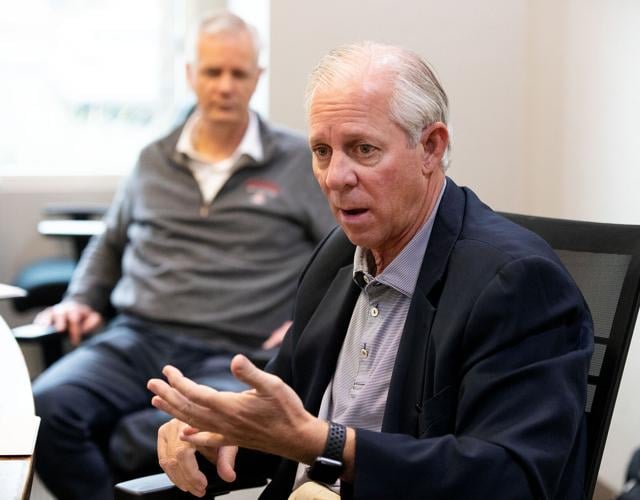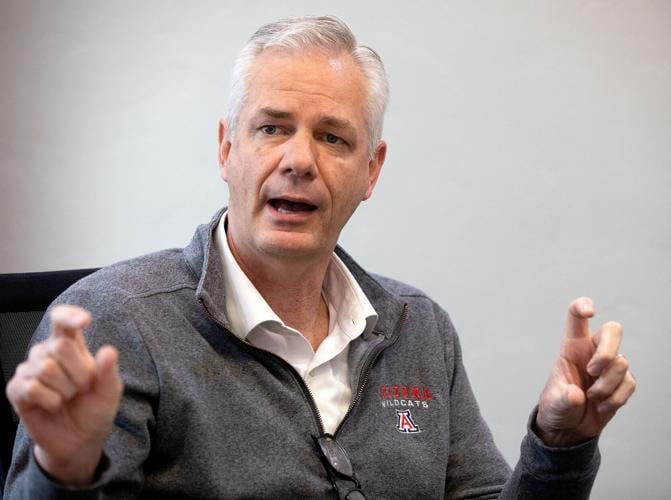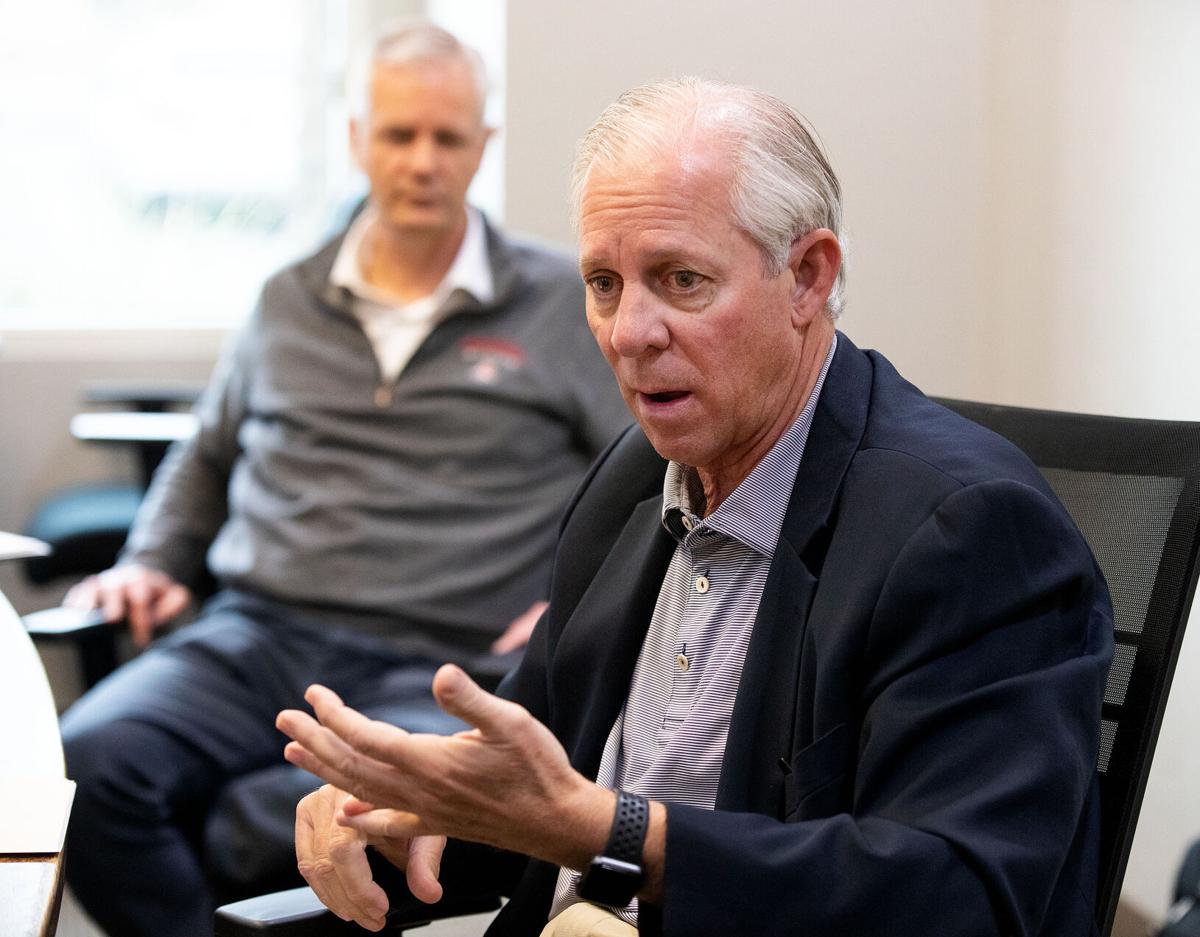University of Arizona President Robert C. Robbins would “absolutely” take a pay cut and has offered to more than once amid the UA’s financial crisis, he told the Arizona Daily Star in an exclusive interview.
His bosses at the Arizona Board of Regents haven’t taken him up on it but “everything is on the table,” said the board’s executive director, John Arnold, who also took part in the interview Friday afternoon.
Robbins made the comment when told that the Star gets many emails from readers asking why he doesn’t take a cut in his more than $1 million salary while UA is reducing budgets and warning of layoffs. He also noted that he temporarily took what amounted to a 37% pay cut when he and other UA employees were furloughed during the COVID-19 pandemic.
Robbins and Arnold, who is also UA’s interim chief financial officer, sat down with the Star for the second time in one week, answering questions for an hour in an effort to increase transparency between UA leadership and community members amid the university’s $177 million budget deficit and "unsustainable" spending of cash reserves.
Layoffs
Arnold has said layoffs can’t be avoided, and Robbins said that there are some “big problem areas” including central administration where there will be cuts.
“We’re going to look at every vice president we have in the organization and say do we absolutely need (them)?” he said.
Robbins declined to answer when layoffs will begin, saying he would “not necessarily” wait until a new fiscal budget year begins on July 1. “I think we’ll be looking at trying to identify some of that rotation sooner than that,” he said.
At a Faculty Senate meeting Monday, Gary Rhoades, chair of the financial recalibration committee, who is working with Robbins and Arnold, said he believed that those making less than $60,000 would be safe from layoffs.
Arnold walked back that statement. “I can’t guarantee that,” he said in Friday’s interview.
Robbins acknowledged he has been pushed by Faculty Senate members to give a number or percentage about layoffs within central administration, but said it is hard to do because “we’ve got to go through every person one by one.”
He added that the number would be “certainly, you know, 10%, 15% something like that,” causing Arnold to interrupt and say it wasn’t “fair” to those individuals to specify a percentage.
“We’re thinking about what the university will need to move forward and operate in a more efficient and stronger way in the future,” Arnold said. “And we’re going to get to that number. I don’t know what that number is, and so I’d hate to give a target because I’m not trying to get to a target. I’m trying to get to an outcome.”
“We’re going to look for efficiencies and procurement and other activities that aren’t employee related,” Arnold said. “We’ll do everything we can to protect jobs but ultimately we’re going to have to get more efficient.”
On Monday, Arnold unveiled the new financial action plan meant to “right size” the university amid the deficit. All budget units are expected to meet with Arnold and his team in the next two and a half months to share how they would deal with a potential 5%, 10% and 15% budget cut. Arnold and his team, consisting of Robbins and other business affairs officers, will then decide if the unit will face budget cuts, and by how much. Arnold said 61 out of the 81 units within the university are operating at a deficit.
Additionally, ABOR will hire multiple consultants to work with university officials to cut back on administrative “bloat,” find ways for the athletics department to be more profitable and help integrate the University of Arizona Global Campus into the main UA structure.
Centralizing
Though some positions within central administration will be cut, there are also efforts to centralize some functions. Facilities, information technology and human resources are examples.
“Athletics has some of their own facilities, student life and housing has some of their own facilities, the rest of campus has some of their own facilities,” Arnold explained. “Can we do that work in a more efficient way? The answer is absolutely we can.”
Arnold wouldn’t commit to whether there will be layoffs within the various facilities teams but said there will be consolidation.
“If we can consolidate all of that under one warehouse, one procurement system, we’re going to take administrative cost out and we’re going to do better,” he said. “What do we need to do to maintain and manage our facilities? Do we have the right staffing model for that once we have everything in place?”
How did this happen?
An increase in inflation and a stagnancy in revenue were main factors that caused the university’s financial troubles, according to Arnold.
The reason 61 out of the UA’s 81 budget units were in a deficit is that “they had the local authority to dip into cash reserves,” he said.
“There wasn’t a reporting structure between those local units back up into the president’s office or anywhere else where we could really see what was happening with all of these local decisions that were being made,” Arnold said. “So, it was literally dozens and dozens of decisions to spend that weren’t being communicated properly.”
The Star previously reported that some units, including the College of Agriculture, Life and Environmental Sciences, claim they were directed to spend their reserves down by senior administrators including former Chief Financial Officer Lisa Rulney and Former Provost Liesl Folks.
Senior administrators within CALES told the Star that Robbins was at a meeting on March 20, 2023, in which they informed him, Rulney and Folks that the college would find itself in a deficit if it kept spending out of its reserves. According to these administrators, their warnings were ignored and they were told to keep spending down the college’s central reserves.
But in his sit down with the Star Friday afternoon, Robbins said he was “unaware that anybody was told to spend their reserves,” adding that he is a “big believer in having reserves in every unit, and particularly academic units, so that you can plan for strategic investment.”
Robbins told the regents in December that he had accepted Rulney’s resignation as CFO, but the Star unveiled last month that she is still employed at the university as a “special advisor” and has retained her salary of over $500,000.
Robbins subsequently told the Star she will stay on through June 30 of this year so the university doesn’t get sued. He said on Friday that she was, as the university’s CFO, “responsible for the health of the university.”
"I am ultimately responsible," he said at another point in the interview.
Rulney hasn’t been at the university working since resigning as CFO but is responsible for “answering Arnold’s calls” when he has questions, Robbins said Friday.
“She’s at home answering the phone that John calls,” he said. “That’s it.”
Changing missions
At a Faculty Senate meeting Monday, Arnold said it was necessary to rethink the mission offered by the UA, which he stated was too broad.
But Robbins said emphatically Friday, “Our mission is not going to change.”
He and Arnold agreed in the interview that the “main” missions of the university — its research prowess, its land grant status and its Hispanic and Native American serving institutional promises — will remain intact.
The focus on research will continue, Robbins said. When he became president in 2017, there was about $600 million in research funding. This year, the university has hit $960 million in research funding, he said.
“Those missions are not going to change,” he said. “We’re going to figure out how we’re going to get through this temporary period to continue to fund that, even through this difficult time.”
At the Monday Faculty Senate meeting, Arnold had said the UA is “geographically isolated,” making it difficult to be all things it wants to be.
On Friday, however, his sentiments seemed to have shifted. “We need to continue to look at the mission that this institution has,” he said. “It’s so unique in the United States and it’s so critical to this geographic area.”
It’s the “smaller” missions, like “improving the merit base level of the student body” through scholarships to non-Arizona resident students, Arnold said, that will be impacted.
In fiscal year 2018, the university gave out $189 million in financial aid. That has jumped to a projected $362 million in aid for fiscal year 2024 and UA will work to continue to lower the amount given to non-Arizona students.
Robbins and Arnold both said they are confident the UA can still attract out-of-state students without offering them large merit aid packages as previously done.
Athletics
Athletics will also be “modernized,” they said. Robbins dismissed Vice President and Director of Athletics Dave Heeke last month.
“I told him that we needed to go in a different direction,” Robbins said of the personnel change. “We need to modernize athletics. The world in that place is changing.”

UA Interim Chief Financial Officer John Arnold speaks during an Arizona Daily Star interview on Friday.
The $86 million in loans that UA made to the Athletics Department in recent years through its central reserves, Robbins acknowledged, might never be paid back.
“We’ve got a lot of internal loans that we make all the time,” he said. “And those are paid off over 30 years. So, I wouldn’t say they could never be paid back. But John and I are going to have to with the provost and see, well, do we just forgive all the debt and start over?”
Despite the university’s financial situation, “I absolutely know, for a fact, that our donors are with us,” Robbins said, adding that the donations the university has seen in its $3 billion fundraising campaign “Fuel Wonder” are still going strong.
“I would predict, we’re going to surpass the $3 billion mark and get beyond that in the next couple of years,” Robbins said.
Transparency within ABOR
ABOR met with Arnold and Robbins on Thursday morning in special executive session, kept private from the public.
“The board is scheduling a series of special board meetings to proactively address the financial issues at the University of Arizona. The board and university will provide regular updates to the public on progress and outcomes,” Regents Chair Fred DuVal told the Star on Wednesday.
These meetings, some faculty have argued in interviews with the Star, should all be public. Arnold defended the executive session.
“There are certain discussions that legally have to be held in private,” he explained Friday. “Several of them are human resource related.”
The next public ABOR meeting will be later this month, he added.
“There’s going to be conversations around how to correct these problems that shouldn’t be public because it’s not fair to the personnel and people who are discussing things and the solution sets that may or may not happen,” Arnold added. “We’re going to give people as much information as soon as we can do it.”
Get your morning recap of today's local news and read the full stories here: tucne.ws/morning






